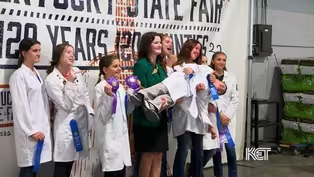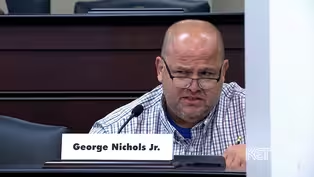
Fighting Opioids Without Drugs
Clip: Season 3 Episode 56 | 4m 47sVideo has Closed Captions
Using NET Device to fight drug addiction.
One woman talks abouther experience using the Net Device and the benefits of it for drug addiction.
Problems playing video? | Closed Captioning Feedback
Problems playing video? | Closed Captioning Feedback
Kentucky Edition is a local public television program presented by KET

Fighting Opioids Without Drugs
Clip: Season 3 Episode 56 | 4m 47sVideo has Closed Captions
One woman talks abouther experience using the Net Device and the benefits of it for drug addiction.
Problems playing video? | Closed Captioning Feedback
How to Watch Kentucky Edition
Kentucky Edition is available to stream on pbs.org and the free PBS App, available on iPhone, Apple TV, Android TV, Android smartphones, Amazon Fire TV, Amazon Fire Tablet, Roku, Samsung Smart TV, and Vizio.
Providing Support for PBS.org
Learn Moreabout PBS online sponsorshipIn July, the FDA approved something called a net device.
It stands for neuro electric therapy.
It delivers electrical stimulation and is used to treat opioid disorders without medicine.
It's also available in Kentucky at Isaiah House.
We sat down with Rebecca, much to discuss her experience using the net device and the benefits of it for the drug addiction.
That's more in tonight's look at medical news.
Everybody in the world, when they wake up in the morning, has the choice of whether or not they're going to use drugs.
Somebody that is in the throes of addiction doesn't really have that choice anymore because they're both mentally and physically dependent on it.
What the device has done for people, it's restored that choice and it's given them the opportunity to actually have that option again.
I came November 2021.
I came because my life at that point was pretty much in shambles.
My mom had told me about a bunch of different treatment options over the years and she had actually told me about the net device and at the time that she had first told me about it, it was only available overseas.
And then she ended up coming back to me and saying that they were doing it in Kentucky.
I was in California at the time and she she said, If I can get you there, will you go?
And I had to take a serious look at my current situation, which, like I said, was not good at all.
And in that moment, I just said, Yeah, I'll go.
I definitely was not necessarily hesitant to try it, but I didn't believe that it was actually going to work.
And and I had actually asked them before.
I was like, So I'll be able to get Suboxone when this doesn't work right?
And they were like, You're not going to need it.
They had put the device on me.
And what they do is they load it with a program that is specific to whatever drugs are in your system.
And so they had loaded it with the program.
They had taped the electrodes behind my ears and then had me turn the device on.
And it was within the first hour I started feeling relief.
You know, all of my withdrawal symptoms were not completely gone at all.
There is still there was still progress to be made, but my back stopped hurting as much.
My legs stopped shaking as much.
I wasn't sweating nearly as much that I was starting to feel better.
And really, by day three, it was it was a noticeable difference, which was completely different than any other time that I had gone through detox.
I think a lot of people hear neuro electric and they think it's some type of electric shock therapy and it's definitely not.
It's controlled by a nine volt battery and it's just a very, very mild sensation behind your ears and and you are in control of it completely.
So it's kind of like it has like a volume knob on it.
And so if it feels like it's too much, you can just turn it down.
You wear it for 24 hours a day and it's up to seven days.
It kind of depends on what drugs you were using, how long you had been using them.
So typically treatment is like between 3 to 5 days, but it can be up to seven days.
Once it's done, it is done.
When I came into rehab before so much time was spent on that detox process and so much time was spent on getting through all of that haziness and that and just feeling awful and not really being able to jump into any of the other things that rehab has to offer.
And you really you're only in rehab for a short amount of time.
So if you're spending, you know, multiple weeks just on the withdrawal process, then you're not going to be able to get everything else out of it immediately afterwards.
It really brings you to a clarity of mind that I had not had in years.
And so it really gave me the opportunity to, like, get into the healing process that I needed to get into, which was the treatment that I got from Isaiah House, getting into the classes, getting counseling, socializing.
I think the biggest issue that that people run into or that we've seen is people that aren't exactly ready to be 100% drug free.
Suboxone has been Suboxone and methadone have really been the only options for people to come off of opiates for so long.
And that's still something that people just mentally struggle with that just kind of are used to putting something in them to make them feel better.
So really, the net devices an amazing option for people that want to get sober and just be 100% drug free.
Much now works at Isaiah House and helps clients with the net device.
She says that after using the device and realizing the positive impact it can have, she hopes to spread awareness about it and get more people to use it in the future.
Video has Closed Captions
Clip: S3 Ep56 | 2m 47s | Kentucky's 4-H in spotlight at Kentucky State Fair. (2m 47s)
Committee Considers Breaking Up JCPS Into Smaller Districts
Video has Closed Captions
Clip: S3 Ep56 | 1m 40s | Nonpartisan commission tells committee the possible impact of breaking up JCPS. (1m 40s)
State Officials React to Hardin County Triple Shooting
Video has Closed Captions
Clip: S3 Ep56 | 1m 5s | Governor Beshear among those reacting to triple shooting in Hardin County. (1m 5s)
This Week in Kentucky History (8/19/2024)
Video has Closed Captions
Clip: S3 Ep56 | 1m 52s | What happened this week in Kentucky history. (1m 52s)
Video has Closed Captions
Clip: S3 Ep56 | 3m 4s | Metcalfe County Schools helps freshmen make transition to high school. (3m 4s)
Video has Closed Captions
Clip: S3 Ep56 | 4m 23s | Thousands of new students descend on the University of Kentucky's campus for move-in day. (4m 23s)
Providing Support for PBS.org
Learn Moreabout PBS online sponsorship
- News and Public Affairs

Top journalists deliver compelling original analysis of the hour's headlines.

- News and Public Affairs

FRONTLINE is investigative journalism that questions, explains and changes our world.












Support for PBS provided by:
Kentucky Edition is a local public television program presented by KET





